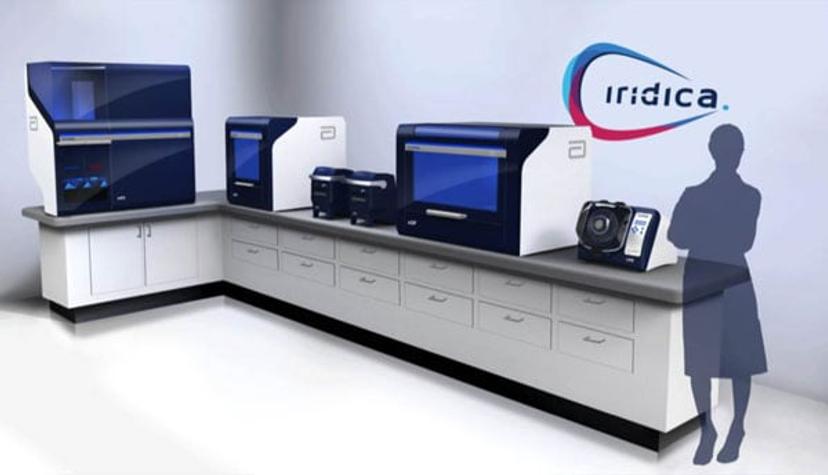The Changing Face of the Clinical Microbiology Lab: Introducing IRIDICA
How Molecular Diagnostics is revolutionizing the way infectious diseases are diagnosed
15 Apr 2015

Rangarajan Sampath, PhD, Senior Director of R&D, Ibis Biosciences, Abbott Improving patient care Abbott’s new IRIDICA platform can identify more than 1,000 infection-causing pathogens in less than six hours. By identifying the source of infections sooner, doctors can improve care for the critically ill.
Broad spectrum antibiotic use contributes to the rise of antibiotic resistance and so the use of IRIDICA can help to combat this problem
Dr. Rangarajan Sampath Ibis Biosciences, Abbott
If there is one area of infectious disease diagnostic science that has been largely overlooked in recent decades, then it has to be clinical microbiology. Blood culture and manual processing still reign in many microbiology labs around the world. However, the modern diagnostic era is ushering in a new age for infectious disease laboratories.
IRIDICA is the new infectious disease diagnostics platform from Abbott. I spoke to Rangarajan Sampath, PhD, Senior Director of R&D, Ibis Biosciences, Abbott. Rangarajan was one of the founders of Ibis Biosciences more than 18 years ago and has been involved in the development of IRIDICA since its inception.
A new era in microbiology
SN: Rangarajan, could you please briefly describe the IRIDICA system and its method of pathogen identification?
RS: IRIDICA is a broad diagnostic platform designed to detect infection-causing pathogens (bacteria, virus or fungus) in a given sample. When a severely ill patient arrives at a hospital, clinicians collect a variety of specimen types, including blood, serum, synovial fluid, tissue, etc, as appropriate. IRIDICA uses a four-step process analyzing these specimens. First, we are able to directly process any of these sample types on IRIDICA without any culture growth. We extract the total genetic material from the sample. Most of the nucleic acid content belongs to the patient, however, some of the DNA will belong to the pathogen. We then use polymerase chain reaction (PCR) to make multiple copies of the pathogens genetic material.
We use multiple, broad range of PCR primer pairs that are able to amplify large groups of pathogens. The amplified DNA is then measured using a mass spectrometer, which determines the molecular weight of the amplified genetic material. Finally, we use proprietary, sophisticated computer algorithms to compute a composite signature across all primer pairs. This observed signature is then matched up to a large database of known pathogen signatures from 1,000s of organisms to identify the pathogen(s) in the original sample. It takes approximately six hours for us to identify the organism of interest, and we do not need to know what type of pathogen we are looking for.
An efficient way to treat patients
SN: What advantages does this system offer over other existing molecular diagnostic systems for infectious diseases?
RS: Our main goal was that our new platform was not to be dependent on culture methods. Most of today's molecular diagnostics, especially for blood-stream infections, rely on culture as the first step. Although relatively low cost, blood culture can be biased and by no means a perfect method. It can take anywhere from eight hours to several days to receive results from cultures, by which time, clinicians will have had to start the patient on broad spectrum antibiotics. Also, studies have shown that culture can be falsely negative in roughly 50% of cases where evidence for infections exist. Not only is this not the most efficient way to treat patients, it is also contributing to the rise of antibiotic resistance. We wanted to move away from blood cultures as well as providing the ability to detect one of thousands of pathogens in a single test from a specimen direct from a patient.
SN: Where is the IRIDICA platform suitable for use?
RS: IRIDICA is suitable for use in practically any clinical setting, such as hospitals, private laboratories, and reference laboratories. The system has the capacity to deal with the throughput requirements of large hospitals.
SN: Does the laboratory technician/ scientist need to have existing experience with mass spectrometry to use IRIDICA?
RS: IRIDICA has been designed for use by trained personnel in clinical laboratories without requiring mass spectrometry expertise. Abbott will provide full training on the IRIDICA platform at the point of installation.
SN: In which countries is IRIDICA currently available for purchase?
RS: IRIDICA is now available in Europe and all CE-Mark recognized countries.

Abbott’s IRIDICA platform, now available in Europe and other CE-Mark recognized countries
SN: Why will lab managers choose to install and implement this platform? What impact will it have on laboratory efficiency and patient care?
RS: Let’s look at sepsis (or septicemia) as a good example. Sepsis management is a huge issue for hospitals; for every hour that treatment is delayed for a septic patient, survival rate decreases by 8%.
Using current methods of blood culture, it could take anywhere between 3-5 days for clinicians to receive the blood results from a patient with sepsis. This waiting time could even be up to 21 days if the infection is fungal in origin. As a result of this, doctors have to treat the patient without knowing for certain what is causing the infection. They do this by prescribing broad spectrum antibiotics. Then when the result has been received, they change the patient therapy to targeted antibiotics against the known pathogen. IRIDICA can shorten the waiting time to within six hours allowing the clinician to review the available information and decide how to treat the patient. Broad spectrum antibiotic use contributes to the rise of antibiotic resistance and so the use of IRIDICA can help to combat this problem.
We are already seeing this in our pilot study, RADICAL. This study was set up to allow us to observe what would happen if we put IRIDICA into a hospital setting. We ran IRIDICA alongside the current standard of pathogen identification (culture). When the results were looked at by an independent reviewer, it was found that in nearly 60% of cases, the doctors would have done something differently if they had had the IRIDICA platform.
In short, IRIDICA gives actionable information in a much shorter amount of time which directly benefits the patient.
Watch this exclusive interview in which Abbott Molecular's Deepak Nath introduces the brand new IRIDICA system at ECCMID 2014.
